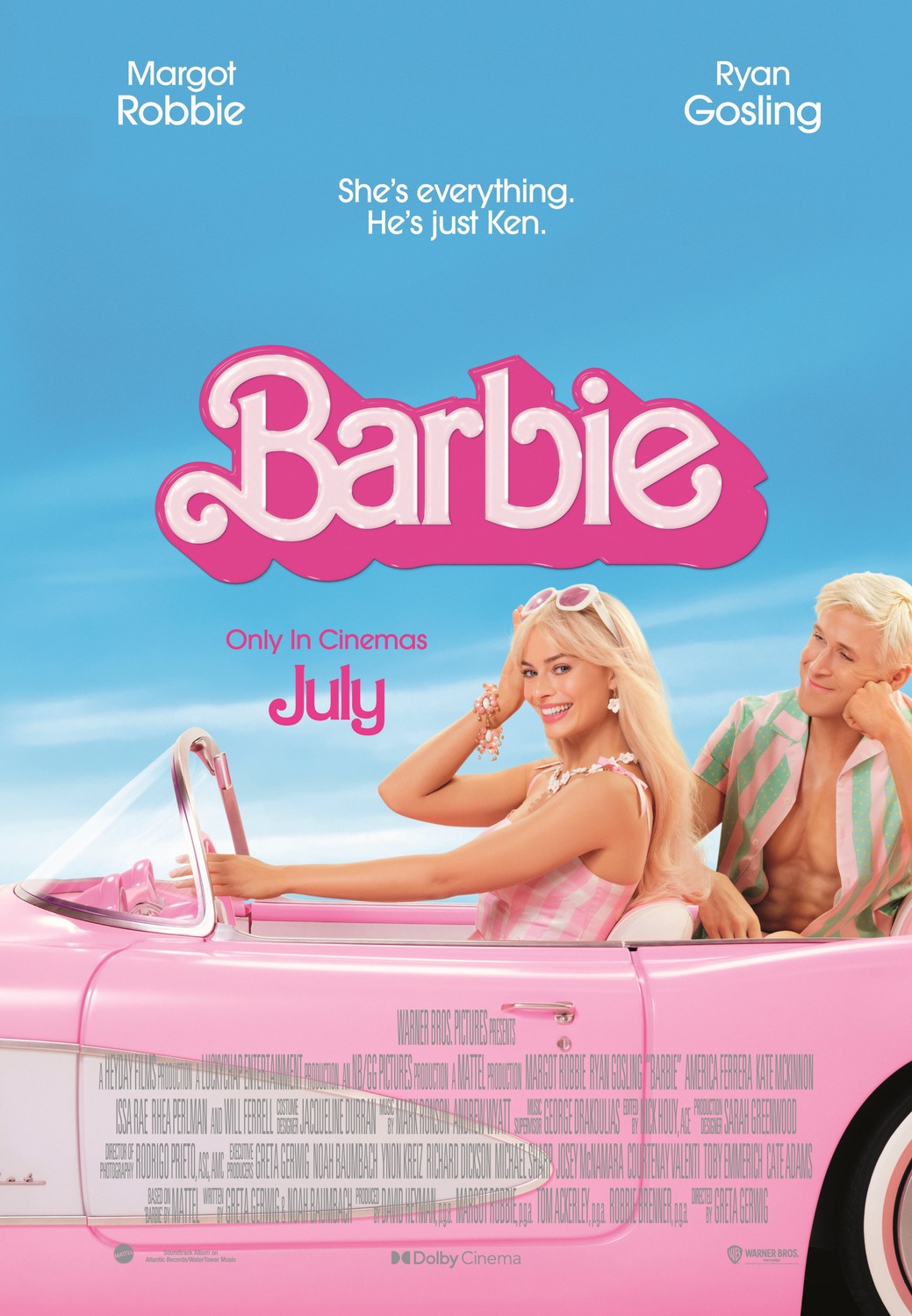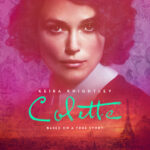Director
Greta Gerwig
Starring
Margot Robbie
Ryan Gosling
America Ferrera
Will Ferrell
The film opens with an introduction and explanation of how things work in Barbieland. Namely the various iterations of Barbie have been pillars of excellence and sources of inspiration for decades, while the multiple versions of Ken have provided loving support. Everything works, everyone is happy, and the world is right and just. This peaceful existence is disrupted when Stereotypical Barbie [Robbie] starts to have creeping thoughts of self awareness, existential dread and death. So, with the aid of Weird Barbie (that one Barbie with lopped-off hair and pen mark over her face, brilliantly portrayed by Kate McKinnon), Barbie heads to the real world to find the girl “playing with her” and help that kid through her crisis so things can go back to normal. Oh, and Beach Ken [Gosling] stows away as an act of undying, unrequited devotion.
For this sort of take on Barbie, or indeed any fantastical story, everyone involved must commit 100% to the concept. Any outlying scepticism or dissent, and the whole thing would crumble. Thankfully, every single actor understands the assignment and helps to create a vibrant and ridiculous, yet believable, world. I honestly could rave about each and every performance because they enhance the story tenfold. Robbie carries such an emotional and psychological weight on her shoulders with seeming ease, Gosling is clearly having more fun than he has in years and is subsequently magnificent, Ferrera shines as the fatigued ‘average mum’, Helen Mirren’s voiceover barbs are perfectly timed, and Michael Cera is an honest treat – it’s just wall-to-wall serious actors exuding sheer silliness. All of which is possible because Great Gerwig and Noah Baumbach’s script is remarkably layered, despite being overtly straightforward and direct with its messaging.
And, in truth, this could have easily been an incredibly dull straightforward tale. A lightweight rehash of The Lego Movie but thanks to Gerwig helming the project, we instead get a subversive story that is surprisingly special, unique and standout. Going beyond the idea of simply an advert to sell toys, or even a celebration of an established brand, arriving at a gut-punching narrative about what it means to be a woman. And that’s where some of the audience may be a little lost. Not those who remember playing with dolls, but those who are only just getting into playing with dolls. It is so quickly apparent that this movie (rated 12a in the UK) is not, first and foremost, an adventure film for children. Barbie is actually a reflective journey of angst and despair, a rallying coping mechanism for the sudden realisation that the world is not what it once appeared and life doesn’t unfold as it was supposed to.
From a technical level, this movie is a production designer’s dream. The Barbieland sequences are astonishingly confident cinema, with life-size recreations of play-sets, decals instead of products, nonsensical physics, and endless fashion options. And with the use of painted backdrops and soundstage choreography, it’s as much a throwback to classic Hollywood, as it is an imitation of how children actually play with their toys. The concern I had, however, was that when Barbie and Ken finally entered the real world, this fun atmosphere would be entirely lost. And for a time, it is. Until, however, Barbie is taken to Mattel HQ. Then, the cartoon hijinks and absurdity return, as if she never left. On the one hand, this dampens the comparison somewhat, but I’ll be the first to admit that if the film had simply remained with that tone, it would have gotten incredibly stale, incredibly quickly.
Then we have Sasha [Ariana Greenblatt]. On Barbie’s quest to connect with the girl whose negative thoughts are creeping into Barbieland, she meets up with Sasha, a teenager who has shrugged off playing with toys. Not only that, she proceeds to give Barbie a complete dressing down, outlining all the ways the toy has established negative beauty standards and set feminism back decades. Remember at the start of this review I mentioned that buying into the film is necessary for its success? Yeah, well, for that to work, Sasha can’t stay that way. She’s gotta find the meaning of Christmas (as it were). And, as such, is a victim of breakneck loyalty shifting that some may consider rushed, forced, or at the very least, elementary.
All of these elements work together to make a strong 4/5 movie that is funny, memorable and joyful. But underneath the pink plastic exterior is one of the most cutting and clearly-presented themes, which rockets this feature to a glowing 5/5: Barbie is the story of what it looks like when a boy becomes a man and a girl becomes a woman. Simple as that. You can get into the undressing of toxicity, the exposure of the levels of backbreaking absurdity that women have to endure, or a wry ribbing of behaviour that is tender with an undertone of “but seriously, you need to stop.” And you can even focus on the audience themselves, with women feeling seen and resonating with the experiences and encounters, and those men who will see this as some all-out anti-male attack because they see themselves on-screen and don’t care for the representation. But that’s the fallout and reaction to the theme. The film is speaking with perfect deftness and heartfelt sincerity, by highlighting how the world we live in alters the chemistry and personalities of individuals. In a sense, everyone is a victim of how our society is structured. Ken isn’t a villain any more than Barbie is pathetic, they’re simply innocent minds wrapped up in a whirlwind of detrimental behaviours and unhealthy traits. And if that isn’t the most important, inclusive, powerful message this film could have presented, I honestly don’t know what is.
Barbie, amazingly, is so bold, confident, self-aware and genuinely hilarious. It’s the kind of film best seen in the cinema with a packed crowd of audience members laughing and crying out loud, and is easily the most fun I’ve had with a film in a long time.
Release Date:
21 July 2023
The Scene To Look Out For:
There are two separate scenes that operate in the exact same way, for two halves of the audience. Firstly we have Ryan Gosling’s song and dance number “I’m just Ken”. Which, aside from being hilarious and well directed, is a thoroughly entertaining analysis of frustration and fatigue in a world that expects so much from men and masculinity. On the other, we have America Ferrera’s monologue to Barbie about the contradictions of being a woman in the real world. It is the most blunt and painfully accurate summation of the hoops women are expected to jump through on a daily basis, just to be told, it’s not enough.
Notable Characters:
There’s no way you can pick one person in this film as standing head and shoulders above the rest. It’s a true ensemble piece devoid of ego, with each character offering legitimate support to some incredibly strong leads.
Highlighted Quote:
“Actually let’s not focus on Midge. She was discontinued because a pregnant Barbie is just weird.”
In A Few Words:
“Given how rote and underwhelming this film could have been, Barbie is an absolute triumph.”
Total Score: 5/5

![The Red Right Hand Movie Reviews [Matthew Stogdon]](https://reviews.theredrighthand.co.uk/wp-content/uploads/2021/12/cropped-header1.png)



